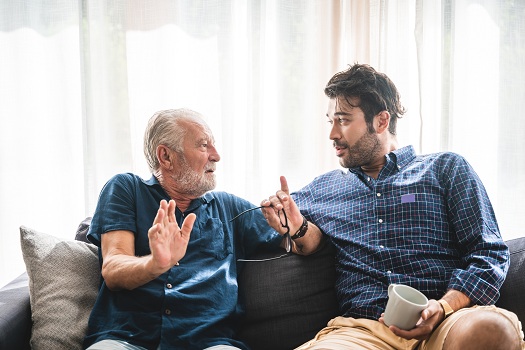An Alzheimer’s diagnosis presents many challenges for both the senior receiving the news and family members who will likely be providing care for their aging loved one. Once it becomes clear your loved one is denying having Alzheimer’s even after receiving a diagnosis, there are constructive ways to initiate a productive dialogue and overcome denial.
Have a Nonconfrontational Discussion
Set up a time to have a talk with your loved one. Remain calm, and don’t challenge the denial. Just ask your parent to listen to your concerns. If possible, hold a family meeting in advance of your discussion to get everyone on the same page.
Alzheimer’s is just one of the many health issues older adults are susceptible to. Seniors can face a variety of challenges as they age, many of which can be mitigated with the help of professional in-home caregivers who provide high-quality home care service. Trust Home Care Assistance to help your elderly loved one age in place safely and comfortably.
Bring in a Neutral Third Party
Sometimes it’s easier to accept things when concerns are expressed by someone without an established emotional connection to your loved one, such as a counselor or therapist familiar with Alzheimer’s care challenges. You might also try going to a local support group together. Sometimes multiple voices are better at getting the message through.
If your senior loved one has been diagnosed with a serious condition and needs help with tasks like meal prep, transportation, bathing, and grooming, reach out to Home Care Assistance, a leading provider of elderly home care Fair Oaks, CA, families can trust. We also offer comprehensive care for seniors with dementia, Alzheimer’s, and Parkinson’s.
Place Alzheimer’s Literature around the Home
Avoid the temptation to overwhelm your loved one with facts. Alzheimer’s disease affects the part of the brain related to reasoning, so your efforts will likely be met with denial. Instead, leave literature around the home your loved one can read on his or her own time. This can be a subtle way to convince your parent to start the conversation.
Go to Doctors’ Appointments Together
By going to doctors’ appointments together, you can bring up concerns your loved one may not be willing to discuss. Your loved one may also appreciate the immediate support you can offer during discussions with the doctor.
Focus on the Positive
While you must acknowledge things will change as the disease progresses, focusing on the positive can counter the initial denial. There have been many advances in Alzheimer’s care that can ease cognitive decline and encourage memory retention.
The days, weeks, and months following an Alzheimer’s diagnosis can be challenging for both seniors and their families. However, these challenges can be made less stressful with the help of caregivers trained in professional Alzheimer’s care. Fair Oaks Home Care Assistance is here to help your loved one enjoy the golden years while simultaneously managing the symptoms of Alzheimer’s. Call us at (916) 485-4663 to create a customized in-home care plan.
